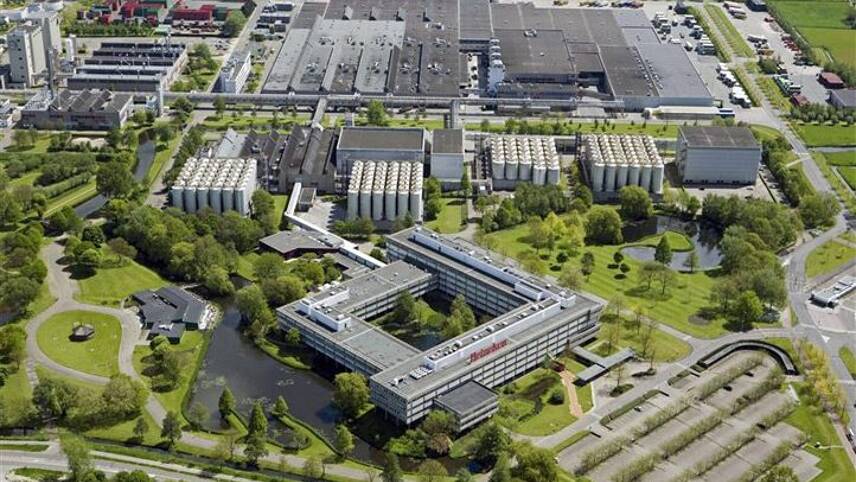Register for free and continue reading
Join our growing army of changemakers and get unlimited access to our premium content

Image: Heineken
The global population is in danger of sleepwalking into a water-related crisis. Water scarcity now affects more than 40% of the global population, a figure that is projected to increase as climate change brings about increased cases of drought and desertification.
However, it seems that very little action is being driven by the private sector to alleviate or reverse this trend. A new report from CDP, released today on World Water Day, has revealed that there has been a near 50% rise in the number of companies that have reported higher water use and withdrawals over the past three years. Just 31 companies assessed by CDP were deemed to be progressing enough on water security to secure an A ranking.
Dutch brewer Heineken received a B ranking from CDP, but has this week launched a new water strategy that will propel the company into a leadership position for both water stewardship and SDG alignment.
The Every Drop ambition for 2030 commits Heineken to maximise water circularity in water-stressed areas to treat 100% of its wastewater worldwide, reduce average water usage from 3.2 hectolitres per hectolitre of production (hl/hl) to 2.8 hl/hl in water-stressed regions and 3.2 hl/hl on a global average – down from 3.5hl/hl.
Finally, Heineken has committed to “fully balance within the local watershed, every litre of water use in products in areas that are water stressed”. Considering that by 2025, two-thirds of the global population could be living in water-stressed conditions, Heineken is re-examining its approach to water use.
Speaking exclusively to edie, Heineken’s head of corporate affairs Blanca Juti claimed that water stress couldn’t be tackled by businesses in isolation, and called for all companies across all sectors to stop ignoring its impact in production.
“When I go to events on water, I see a lot of the beverage industry, but I’d like to see the rest of humanity present, because everything we consume uses water,” Juti said.
“We all need to be conscious of the fact that water is required for every product we consume and almost every manufacturing process. What you’re interacting with has been made with water to some extent. We’re ignoring the fact that water is an issue in many parts of the world and should be tackled globally.”
Juti noted that brewers have historically focused on water because it is central to the growing process for ingredients and the production of beer. However, studies have shown the beer is less water intensive than the production of wine, chicken, beef or pork, yet Juti feels that some manufacturers are ignoring the economic and environmental potential to act on water.
Every Drop
Heineken already treats 96.5% of its wastewater worldwide, returning it clean to the environment, but the new water target will aim to treat 100% of wastewater of all breweries globally.
Juti claimed that to reach this target, Heineken would have to explore an array of solutions, many of which requiring new partnerships with NGO and governing bodies to help alleviate pressures in water-stressed regions.
in Spain, for example, one billion litres of water are restored annually through a wetland restoration program in Doñana, in southern Spain that Heineken has played a key role in. In Mexico, through the Monterrey Water Fund, the company is working collaboratively on reforestation, landscaping and biodiversity projects that have absorbed more than 450 million litres of water; helping to mitigate flooding and improve water infiltration.
These community-focused projects are being complemented by specific technologies to help Heineken lower its water impact. In Malaysia, investments into rainwater harvesting projects are helping communities save water, while in Indonesia Heineken employees are creating ‘biopori’ holes: narrow, meter-deep pits dug into the soil and filled with vegetable scraps and compost material. By slowing rainwater runoff, biopori holes preserve water and prevent flooding.
Juti is keen to ensure that these solutions don’t just benefit Heineken, despite many projects having a better return on investment than technologies like desalination, which the company is also using in the Bahamas.
That’s why a key role of the Every Drop strategy is to promote water circularity that can assist other businesses.
“We realise that in a water scarce area, our current approach is not enough,” Juti added. “You need to look at it from the point of view of the watershed; you’ll have many users and if everyone takes a little bit out, over time it will dry out. We realised that what we should be doing instead of just focusing on our own brewery, is to replenish water to the watershed.
“Now we’re thinking circular and we looking to reuse water in our processes or share with our next-door neighbour, so they don’t have to pull from the watershed. The idea is to reshare as much of the water as possible.”
The CDP report revealed that around 75% are now reporting exposure to substantial water risks, a near 5% increase compared to 2015. It is also estimated that 75% of all jobs depend on water supplies to function. Water stress is now impacting firms financially. Companies reported $14bn in water impacts in 2016, with many firms expecting risks they’ve highlighted to materialise over the next five years.
Currently, 26 of Heineken’s 170 breweries are located in water-stressed regions, although the number could rise in the future if global action isn’t taken. Juti hopes that World Water Day can act as a catalyst that encourages businesses to work together to solve a common issue.
“The world needs to discuss water a lot more,” Juti said. “I’d love to see water discussed between different industries in the same way that climate change is. But water is not getting the love it deserves as a valued resource.”
Matt Mace


Please login or Register to leave a comment.